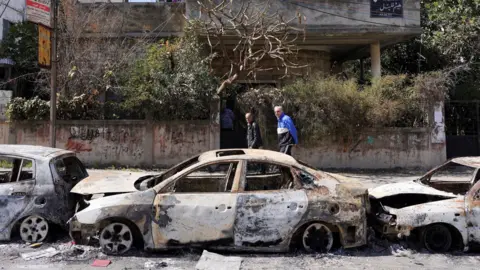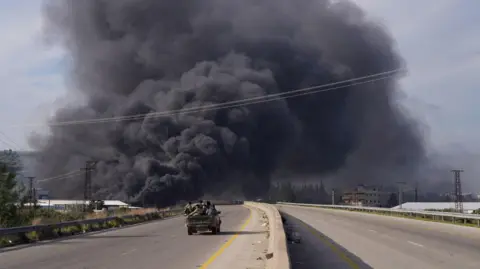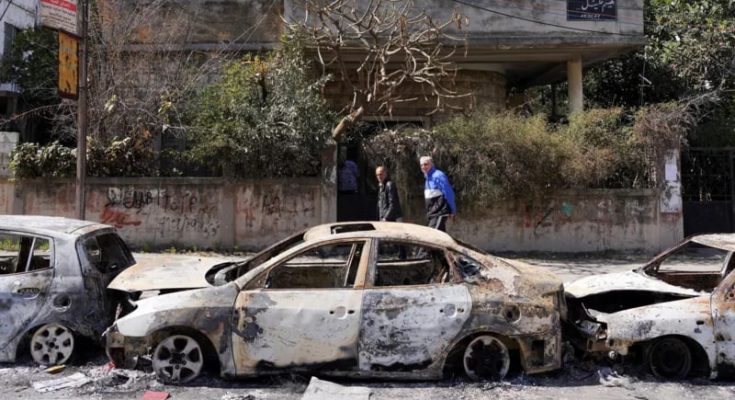War crimes likely committed in Syria coastal violence, UN says
 Reuters
ReutersMembers of Syria’s interim government forces as well as fighters linked to the former regime likely committed war crimes during sectarian violence in March that killed around 1,400 people, mainly civilians, a UN report says.
The UN Syria Commission of Inquiry said it had found no evidence the authorities in Damascus had ordered the attacks.
The violence along the coast, the heartland of the Alawite sect of Islam, exposed divisions after Islamist-led rebels ousted ex-President Bashar al-Assad in December.
It erupted as security forces were ambushed by groups loyal to the former regime, leading to clashes between government forces, largely Sunni Muslim, and Assad loyalists, mostly Alawite.
The authorities sent reinforcements, who were also joined by thousands of fighters, and the operation turned into revenge killings of a sectarian nature.
After decades of brutality under the Assads in the mainly Sunni country, many associate Alawites, which make up around 10% of Syria’s population, with the old regime.
According to the UN commission, “acts that likely amount to crimes, including war crimes” including murder, torture, abductions, and inhumane acts related to the dead were committed by interim government force members as well as fighters linked to the Assad regime.
The commission called on the government, which launched an inquiry, to expand accountability efforts.
“The scale and brutality of the violence documented in our report is deeply disturbing,” Paulo Sérgio Pinheiro, chair of the UN Syria Commission of Inquiry, said in a statement.
“We call on the interim authorities to continue to pursue accountability for all perpetrators, regardless of affiliation or rank. While dozens of alleged perpetrators of violations have reportedly since been arrested, the scale of the violence documented in our report warrants expanding such efforts.”
The report also warned that retaliatory attacks are continuing “amidst a heightened climate of fear and must urgently be addressed by the interim government”.
The commission documented “gross human rights violations” in 16 locations in Latakia, Tartus, Homs and Hama governorates populated primarily by Alawites in early March.
Perpetrators, it said, went door to door asking civilians in a majority of cases whether they were Alawite, before taking men and boys away to be executed.
Most victims were Alawite men between 20 and 50 years old, according to the report, although women and children as young as one were also killed in house raids.
Armed individuals filmed themselves committing “serious human rights violations”, it said, including severe beatings and executions, or walking alongside dead bodies.
Fearing reprisal, families were forced to keep the bodies of their loved ones inside their homes for days, or in the streets to be buried in mass graves later. Hospitals were overwhelmed as corpses piled up.
Thousands fled to neighbouring Lebanon or a Russian airbase for safety. Many survivors and Alawites have since left to other parts of Syria or sought refuge abroad, the report said.
The report concluded that the consistent patterns of targeted violence against civilians “indicates that such acts were not random or isolated”.
The commission conducted more than 200 interviews with witnesses and victims and gained access to coastal areas and affected communities.
 Reuters
ReutersAssad was overthrown in December after 14 years of civil war and documented human rights abuses by his regime. An interim government was formed, led by a former rebel, Ahmed al-Sharaa.
The report found the security vacuum after Assad’s ouster as well as disinformation and hate speech spread online about Alawites contributed to retributive attacks.
After clashes escalated between former and pro-government factions, other fighters, including foreigners, joined government forces mobilised to coastal regions.
The government issued statements instructing civilians not to take up arms and warning fighters against harming civilians, the report said.
Curfews were established, and in the city of Tartus, checkpoints to stop fighters entering spared the city from violence seen elsewhere.
A government inquiry, published in July, identified 298 alleged perpetrators among individuals and groups within military factions, and 265 alleged perpetrators linked to former government fighters.
Officials told the commission in June that 42 people had so far been arrested for alleged abuses. The government also said it had created a complaints office for security and police personnel misconduct cases.
The commission recommended the government strengthen its courts system to ensure justice, work on reparations for survivors, and build trust with communities, among other measures.
Sectarian violence has erupted elsewhere in Syria since March.
Last month, hundreds were reported killed in clashes in Suweida in the country’s south. Both Bedouin and Druze fighters as well as the Syrian army have been accused of killing civilians and extra judicial killings.
The government said it was aware of reports of “shocking violations” by people wearing military fatigues and told the BBC any allegations of atrocities committed by all sides would be fully investigated.



